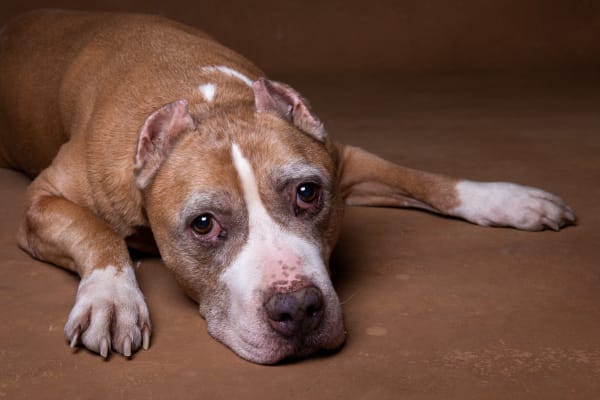What is doggy diarrhea?
Doggy diarrhea isn’t a condition in itself, but a symptom of a health issue. When your dog’s stomach doesn’t absorb nutrients properly, these nutrients can retain water, or water may enter the intestines.
In these cases, the intestinal lining is overwhelmed by fluid and is not able to absorb water and nutrients, resulting in what many pet owners dread - large amounts of fluid or soft stools, that often end up in a mess for you to clean up!
Another way diarrhea may happen is if substances or diseases inflame or irritate the intestinal lining, this can cause increased movement of fluid and electrolytes into the intestines, where absorption can be impaired.
There are three types of diarrhea in dogs: acute (sudden diarrhea), chronic diarrhea (which can last for weeks or months in duration), and intermittent diarrhea (which may happen off and on). The underlying cause will often determine which type your dog experiences.
What causes doggy diarrhea?
Diarrhea can be an indication of many issues, such as stomach upset due to a diet misadventure. In these cases, the bacteria that’s always in his intestines may be disrupted enough to cause the tummy trouble.
Here are some of the most common causes we see in dogs that come through our doors:
- Change in dog food or treats
- Bacterial growth in intestines
- Stress or anxiety due to travel, boarding, rehoming or the introduction of a new family member, whether pet or person
- Viral infections
- Pancreatitis
- Poisoning/contact with toxins
- Kidney or liver disease
- Parasites, including worms
- Intestinal cancer
Needless to say, because there is such a wide range of potential causes, it’s imperative that the cause is pinpointed by a veterinarian as soon as possible.
You are your veterinarian’s best resource for information on your dog’s bathroom habits, so be prepared to tell the vet:
- How long your dog has been experiencing diarrhea
- If there have been any changes to your dog’s diet (new food or treats)
- Whether your dog has recently ventured into a garbage can or compost area
- What your dog’s stool looks like (color and consistency), and whether there has been mucus or blood in it
It’s important to find out whether the diarrhea is related to your dog’s small intestine or large intestine, which can require different diagnostic tests. With small intestinal diarrhea, the stool may be dark-colored, which points to bleeding in the stomach. Your dog may defecate with normal frequency, but can also vomit during the same episode.
Large intestinal diarrhea tends to cause your dog to pass feces much more frequently and produce smaller-than-normal amounts of stool that may contain mucus. Any blood in this stool typically looks fresh and bright red.
When should I visit my veterinarian if my dog has diarrhea?
Though many acute cases of diarrhea resolve on their own in one to two days, there may not be reason to worry if they are eating and behaving normally.
If your dog has existing health issues such as kidney disease or diabetes, do not let diarrhea persist beyond two episodes. The same caution should be taken if your dog is a very small breed, or is a senior dog, as these dogs can quickly suffer from dehydration. Notify your vet immediately if any of these circumstances apply.
If the bout of diarrhea lasts more than two days or if other symptoms have appeared, there may be an obstruction that requires immediate, qualified veterinary attention and treatment. You can always give your veterinarian a call to confirm whether the issue is urgent - you may save the life of your pet.
Is your dog suffering from diarrhea? Our veterinarians can diagnose diseases and conditions and plan treatments. Book an appointment today.

Looking for a vet in Asheville?
We're always accepting new patients, so contact our veterinary hospital today to book your pet's first appointment.Related Articles View All
Your Guide to Cat Rabies Symptoms & Prevention
Rabies is not only fatal for cats, it can be passed from our feline friends to us! In today's post, you will learn how rabies is spread, what makes it so deadly, what symptoms to look for, and how rabies in cats can be prevented.
Tooth Resorption in Cats
Is your cat reluctant to eat, drooling or showing other unusual behaviors? If so, it could be due to painful tooth resorption. Our North Asheville vets explain the signs to watch for and how tooth resorption can be treated.
Inflammatory Bowel Disease in Dogs, Life Expectancy
At Animal Hospital of North Asheville our vets often treat dogs with inflammatory bowel disease (IBD), and while there is no cure for this condition, in many cases IBD can be managed successfully. Here we look at the prognosis for dogs suffering from IBD.
What is hip dysplasia in dogs? How is it treated?
Hip dysplasia is a condition characterized by the abnormal formation of one or both your dog's hips leading to pain when exercising or changing position. Here our North Asheville vets explain more about hip dysplasia, its symptoms and the surgeries used to treat this condition.
